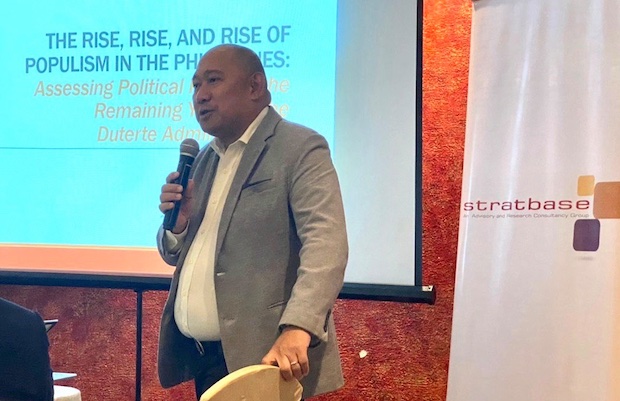
Dindo Manhit, shown here at a 2020 forum, is the founder and president of Stratbase ADR Institute. (File photo from the Facebook page of Stratbase ADR Institute)
MANILA, Philippines — “We need to collectively expose and denounce trolls,” Dindo Manhit, founder and president of Stratbase ADR Institute, an independent Philippine-based think tank, said in a statement issued on Wednesday.
“Filipinos have a moral duty to counter disinformation because it threatens democracy by hampering people’s ability to make enlightened decisions for their lives and the future of our nation,” Manhit said.
Several advocates of transparency in governance also agreed on this point during the fifth and last session of Pilipinas Conference 2021, titled “Recovering Philippine Democracy Beyond 2022” organized by Stratbase ADR Institute late last November.
“We should learn from the damaging lessons of these times,” Manhit said.
According to Manhit, generations of Filipinos fought for our democracy, and that democracy should prevail in our country, “founded on the ideals of transparency and accountability.”
Meanwhile, Dr. Francisco Magnom, a Stratbase ADR trustee, reminded citizens should go beyond casting their votes and continue to be engaged in between elections.
“Participation is a mechanism — is a process for fostering transparency and accountability, so when we discuss participation, it has to be considered in the context of how it actually promotes transparency and accountability,” he said.
This, according to advocates, then raises the urgency of choosing the correct candidates in this coming election.
At the same conference, Natalie Christine “Ching” Jorge, chief of Youth Leadership for Democracy (YouthLed), noted that the Philippine government had deepened its “democratic backsliding” with its “crackdown on free media, the curtailing of freedom of expression, the militarization of the pandemic, response, executive overreach, and weakening checks and balances.”
However, she pointed out that the youth could change this, considering that it represents 30 percent of the Philippine population while 52 percent of voters for the 2022 elections fall below the age of 35.
“There is tremendous potential for youth to significantly influence democratic governance in the Philippines with young people demonstrating grounded knowledge and issues affecting the country,” she said.
“Young Filipinos are more inclined towards individual, civic, political action, online and issue-based collective action. There is less interest in politics but more focused on social issues and social change. By allowing the generation of young Filipinos to organize and express themselves this way, we pave the way for stronger democratic engagement,” Jorge added.
On the other hand, Dr. Julio Teehankee, political science and international studies professor at De La Salle University, noted how scholars were puzzled why some countries that had undergone a transition to democracy would suddenly return to “power of parties and personalities who have deep roots in the dictatorship.”
“It is confounding to note that after gaining the right to pick their leaders in free and fair elections people would still vote for candidates identified with the authoritarian regime,” he said.
This, according to him, has greatly affected the consolidation of the country’s democratic gains and has weakened our electoral and party system.
“It all depends on us, those who would want to make an impact on the outcome of next year’s election and prevent further regression and backsliding. And this can be done if we go out of our respective echo chambers,” Teehankee said.
“The real struggle is outside social media. Not talk down on the voters, not to look down on the poor voters, but to try to understand and listen and address the concerns they have,” he added.
RELATED STORIES
Everyone loses in a fight with trolls — communication experts
Troll hunting must start at the top – media expert
Study: DDS susceptible to fake news